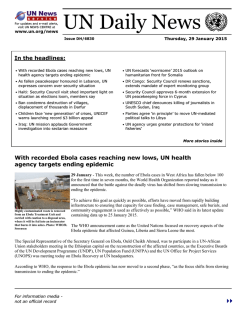
The Other Side of Low Oil Prices
January 2015 The Other Side of Low Oil Prices by Jon B. Alterman ..................................................................... American consumers have celebrated the sharp drop in oil prices. In recent weeks, gasoline prices in many American communities have brushed against $2 per gallon, promising to put more than $500 annually into the pockets of the average American family. For policymakers concerned with the Middle East, the results of lower oil prices are more mixed. The emerging consensus appears to be that the drop will mean some belt-tightening for wealthy U.S. allies in the Gulf, but it will be disastrous for three countries with which the United States has strained relations: Russia, Iran, and Venezuela. In the minds of many, that’s a net gain. It would be a mistake, though, to not appreciate the profound effects of lower oil prices on a range of other U.S. allies in the Middle East. These effects are all slow moving, and most are indirect, but they are likely to pose as great a challenge to regional governments as the 2011 protests. On a direct level, poorer states that import most of their oil benefit from lower prices. Many Middle Eastern governments subsidize gasoline, diesel fuel, and electricity, and lower global oil prices mean lower subsidy bills. That is all to the good. Yet, many oil-importing countries in the Middle East are also labor-exporting countries. Egypt, Lebanon, Jordan, Morocco, and others send millions of highly skilled workers to work in the oil-exporting countries of the region, and these workers return billions of dollars a year to their families at home. According to the World Bank, as oil prices drifted upward after the 2008 financial crisis, the amount of money sent back home drifted upward, too. Remittances to Egypt more than doubled between 2009 and 2013, reaching almost $18 billion per year—more than three times Egypt’s Suez Canal revenues. In Lebanon, which has only 4.5 million residents, remittances accounted for $7.5 billion in 2013. For the region’s wealthier states, growing pools of foreign workers served several purposes. They improved services for people at home, and they helped support the economies of governments the Gulf states considered friendly. When regional politics turned volatile in 2011, wealthier governments poured money (continued on page 2) Gulf Roundtable: Will GCC Unity Hold? Improving relations among the Gulf Cooperation Council states are a sign that governments are feeling increasingly stressed, according to Dr. F. Gregory Gause III, and inter-state tensions would likely return if threats diminished. Gause spoke at a CSIS Middle East Program Gulf Roundtable entitled “Will Unity Hold? The GCC and the Challenge of Joint Action” on December 12, 2014. Gause argued that shifts in both Qatar’s top-level leadership and foreign policy made this rapprochement possible, but that it remains to be seen whether Qatar’s pattern of idiosyncratic foreign policy behavior has truly come to an end. You can read a full summary of the event HERE. ■ Weed Whacking As regional conflicts blaze, Lebanese and Israeli drug markets are feeling the heat: over the past two years, hashish prices have fallen 50 percent in Lebanon, while in Israel, prices have doubled. Preoccupied by the neighboring Syrian conflict, the Lebanese army has been diverted from its annual cannabis eradication campaigns, giving cannabis farmers more freedom to cultivate their crops than at any time in 20 years. Much of the resultant production goes to the local market, pushing down prices and profits for farmers. The crisis in Syria has closed many of Lebanon’s border crossings, but the war-time economy has emboldened and benefited the region’s smugglers. For those who can assume the risk, the reward is huge: according to some, cannabis can sell in Turkey for 25 times what it would in Lebanon. In Israel, increased border controls have cut supply. The new security fence along Israel’s Egyptian border and tighter security on the Lebanese border have reportedly choked off smuggling routes, sending prices soaring. According to some estimates, 70 percent of Israel’s cannabis supply came from Egypt and Lebanon a decade ago, but today, less than a third does. More Israelis are turning to growing marijuana in hydroponic operations, but the higher-quality drugs can cost three times as much as cannabis smuggled through the Sinai. In a region torn by conflict, marijuana prompts a measure of unity: there are rising calls in Israel and Lebanon to legalize the plant. So far, the calls have created nothing but smoke. ■ 1616 Rhode Island Ave NW, Washington DC 20036 | p. 202.775.3179 | f. 202.775.3199 | www.csis.org/mideast 2 | CSIS Middle East Notes and Comment | January 2015 into improving their own citizens’ lives, and having foreign workers and advisers helped build infrastructure and governmental capacity. When money was flush, wealthy governments could afford to be generous at home and abroad. With oil prices less than half what they were in June, money is no longer flush. Having built up large reserves, wealthy governments can endure years of lower prices without cutting benefits and subsidies to their citizenry. Yet, three patterns of spending will surely decline. First, confidence in a price rebound is too weak to sustain current employment patterns with the foreign workforce. There will not be panic, but ambitions will be trimmed, openings will be slowed, and projects will be allowed to lapse. As this happens, workers will depart and remittances will decline. This is what happened in the post-2008 environment, when oil plunged from $140 per barrel to $40 per barrel in short order, and it will happen again. At the same time, the billions of dollars that Gulf governments have passed to close U.S. allies such as Jordan, Oman, and Bahrain since 2011 will begin to dry up. So too will the tens of billions that have flowed into Egypt from the Gulf—first from Qatari support for the Muslim Brotherhood-led government of Mohammed Morsi, and then Emirati, Saudi, and Kuwaiti support for the secular nationalist government of Abdel Fattah al-Sisi. The Gulf states’ approach to the Arab uprisings was to treat them as an economic phenomenon, and they spent freely in the region to smother any contagion of regional instability. Now, the wealthier states are becoming more inwardly focused. They need to prioritize. As they do so, aid projects in neighboring states are taking longer than expected to get off the boards, and Egypt’s foreign exchange reserves are dwindling again. Reuters last week quoted one economist as saying that no further aid to Egypt is expected from Gulf countries. And there is one more element that will play into this mix. Some of the most fragile states in the region—Yemen, Libya, and Iraq—are facing reduced revenues from oil sales at precisely the time when they are trying to build governing coalitions. A drop in prices in these oil-exporting states means they have fewer resources to expend on either patronage or weapons. Both diminish governments’ resilience in the face of guerilla groups such as the Islamic State, Ansar al Shari‘a, and al Qaeda in the Arabian Peninsula, all of which are hostile to U.S.-aligned political forces in each country, and each of which has targeted U.S. citizens. For the Obama administration, the emerging reality poses an uncomfortable conundrum. The administration’s view in 2011 had been that the only durable response to public dissatisfaction in the Arab world was a more inclusive political process. It pushed for some accommodation of religious political parties in the Middle East as part of a broader opening of political space. Notably, leaders such as Hosni Mubarak and Zine el-Abidine Ben Ali, who sought to accommodate protestors, were pushed from office. In part because of these early outcomes, U.S. allies in the region were skeptical of the politically centered approach. They cracked down on politics rather than opening them up, and they pushed economic benefits. Their economic approach worked for a time, but with lower oil prices, poorer states’ governments will face new challenges. The most fundamental challenge is this: after 2011, no one doubts that leaders who fail to deliver results can be deposed. After all, crowds brought down the last two Egyptian presidents who did not deliver. Without a clear political course to pursue, and with large-scale economic assistance diminishing, the near-term prognosis is more volatility. For the United States, the Middle East is likely to require more attention in the years to come, and the instinct will be to declare the region hopeless and devote less. Doing so would be a grave mistake. ■ 1/27/2015 Links of Interest The CSIS Middle East Program launched its latest book, Religious Radicalism after the Arab Uprisings, on December 15, 2014. Bloomberg quoted Jon Alterman in “Salman Becomes Saudi Monarch.” The New York Times quoted Jon Alterman in “New Saudi King and U.S. Face Crucial Point in the Relationship.” CBS News quoted Haim Malka in “Yemen instability reveals limits of U.S. counterterrorism strategy.” The LA Times quoted Jon Alterman in “Saudi king’s death could bring ‘prolonged era of leadership change.’” Foreign Policy quoted Jon Alterman in “Al Qaeda: Zawahiri ordered ‘Charlie Hebdo’ attack.” The Middle East Notes and Comment electronic newsletter is produced by the Center for Strategic and International Studies (CSIS), a private, tax-exempt institution focusing on international public policy issues. Its research is nonpartisan and nonproprietary. CSIS does not take specific policy positions; accordingly, all views, positions, and conclusions expressed in this publication should be understood to be solely those of the author(s). © 2015 by the Center for Strategic and International Studies. The CSIS Middle East Program Jon B. Alterman Senior Vice President, Brzezinski Chair in Global Security and Geostrategy, and Director, Middle East Program Haim Malka Deputy Director and Senior Fellow Carolyn Barnett Research Fellow Rebecka Shirazi Associate Director Zachary Cuyler Meaghan DeWaters Maxwell Peck Interns 1616 Rhode Island Ave NW, Washington DC 20036 | p. 202.775.3179 | f. 202.775.3199 | www.csis.org/mideast
© Copyright 2026











